1. Perfil de sonido: lo que oirás
El sonido que produce un teclado es muy importante para muchas personas.
Acústica del teclado mecánico
Los teclados mecánicos son conocidos por los sonidos distintivos que producen al escribir. Esto se debe a que los interruptores tienen partes móviles que hacen contacto físico. Existen interruptores que son intencionalmente ruidosos y "clic", lo que proporciona una respuesta audible muy clara con cada pulsación. Otros ofrecen una sensación táctil al activarse la tecla, a menudo con menos ruido que un interruptor "clic". También existen interruptores "lineales" que son más suaves y generalmente más silenciosos, aunque aún producen algún sonido al tocar la tecla o al volver hacia arriba.
Las personas a quienes les gusta una respuesta auditiva o táctil notable a menudo prefieren los teclados mecánicos.
Funcionamiento silencioso de los teclados magnéticos
Los teclados magnéticos funcionan de forma diferente. Utilizan sensores (generalmente de efecto Hall ) para detectar la posición de un imán fijado a la parte móvil del interruptor. Al no necesitar un mecanismo de clic físico para registrar la pulsación, estos teclados suelen ser mucho más silenciosos. Aunque se oye el sonido de la tecla al golpear la base, el interruptor suele ser prácticamente silencioso. Esto los convierte en una excelente opción para espacios de trabajo compartidos, entornos domésticos tranquilos o si simplemente se prefiere menos ruido al escribir o jugar.

2. Rango de precios y valor
El mercado de teclados mecánicos es muy amplio y consolidado. Esto significa que existe una amplia gama de precios. Puedes encontrar opciones económicas y funcionales a precios relativamente bajos, a veces inferiores a $50. Los teclados de gama media ofrecen mejor calidad de construcción y características, mientras que los teclados mecánicos de gama alta o personalizados pueden costar varios cientos de dólares o más. El precio depende de factores como la marca, el tipo específico de interruptores utilizados (p. ej., Cherry MX originales o clones), los materiales de la carcasa (plástico o metal), la calidad de las teclas (ABS o PBT) y funciones adicionales como la iluminación RGB o la conexión inalámbrica.
La tecnología de interruptores magnéticos es más reciente en el mercado de consumo y, por lo general, más compleja de producir. Por ello, los teclados magnéticos suelen tener un precio inicial más elevado que los teclados mecánicos de gama básica. Normalmente los encontrarás en rangos de precio entre medios y altos, de marcas especializadas en periféricos para juegos, como Attackshark . Si bien el costo inicial es mayor, algunos argumentan que la posibilidad de una mayor vida útil de los interruptores podría ser beneficiosa con el tiempo, aunque esto aún se está demostrando a largo plazo.
Considera tu presupuesto y prioridades. Los teclados mecánicos ofrecen más opciones en todos los rangos de precio. Los teclados magnéticos suelen requerir una mayor inversión inicial , a menudo justificada por sus características avanzadas y su posible durabilidad.
3. Durabilidad y mantenimiento
¿Cuánto dura y es fácil de mantener?
Los interruptores mecánicos registran las pulsaciones de las teclas mediante contacto físico, generalmente entre pequeñas piezas metálicas. Si bien los interruptores mecánicos de alta calidad tienen una capacidad de muchos millones de pulsaciones (generalmente entre 50 y 100 millones), estos puntos de contacto físico pueden desgastarse con el tiempo y causar problemas como que las teclas no se registren o que lo hagan varias veces ("vibración"). También pueden ser propensos a que el polvo o los derrames obstruyan los contactos.
Los interruptores magnéticos eliminan la necesidad de contacto físico. El sensor detecta la presencia del imán sin necesidad de contacto entre los componentes para activar la finalización del circuito. En teoría, esta falta de contacto físico en el mecanismo central debería reducir el desgaste a largo plazo y, como resultado, prolongar la vida útil del interruptor y garantizar la continuidad de su funcionamiento. También es menos probable que causen ciertos problemas provocados por la acumulación de polvo en el propio punto de contacto (aunque aún es probable que se produzca adherencia generalizada a causa de la suciedad).
Ambos teclados requieren una limpieza periódica para eliminar el polvo y la suciedad. En los teclados mecánicos, si un interruptor falla y la placa es intercambiable en caliente, es fácil reemplazarlo. De lo contrario, debe soldarse. Reemplazar o reparar un interruptor magnético defectuoso puede ser más complicado y aún no ser reemplazable por el usuario, y a menudo requiere la ayuda del fabricante, ya que la tecnología para reemplazar piezas simples aún no está desarrollada.

4. Idoneidad y aplicación del usuario
¿Quién suele beneficiarse más de cada tipo?
Entusiastas de los juegos:
Los teclados magnéticos han ganado una popularidad significativa aquí, principalmente debido a
- Puntos de accionamiento ajustables : Permite configurar la profundidad de pulsación de una tecla para que se registre. Puedes hacer que las teclas de movimiento sean supersensibles para reacciones rápidas, o quizás que una tecla de habilidad definitiva requiera una pulsación más profunda.
- Disparo Rápido : Esta función permite que una tecla se restablezca al levantar el dedo, lo que permite pulsaciones repetidas más rápidas que con la mayoría de los interruptores mecánicos tradicionales. Esto es muy útil en juegos de ritmo rápido.
Los teclados mecánicos siguen siendo muy populares y efectivos para jugar, especialmente los interruptores lineales para una acción suave, pero los teclados magnéticos ofrecen estas funciones de personalización avanzadas específicas.
Profesionales de oficina
Los factores clave suelen ser la comodidad al escribir, la precisión y el nivel de ruido.
- Magnético : Su silencio es una gran ventaja en la oficina. Su suave desplazamiento también contribuye a que las sesiones de escritura sean cómodas y prolongadas.
- Mecánico : Muchos prefieren la respuesta táctil de interruptores como los Cherry MX Brown (o equivalentes) para mayor precisión al escribir. La protuberancia ayuda a confirmar la activación sin ser excesivamente ruidoso. También existen numerosas opciones mecánicas ergonómicas.
Usuarios creativos y consumidores en general
Esta categoría probablemente consideraría la estética, las características únicas y la experiencia de escritura en general. Los teclados magnéticos probablemente atraerían a los entusiastas de la tecnología interesados en las últimas funciones, como la entrada analógica (donde una sola tecla puede actuar como un joystick). Los teclados mecánicos ofrecen una amplia variedad y una experiencia de escritura bien definida, que muchos prefieren para el uso regular precisamente por eso.

5. Opciones de personalización
¿Cuánto puedes personalizar tu teclado?
Capacidad de personalización de los teclados mecánicos: esta es una de las principales fortalezas de los teclados mecánicos.
- Tienes acceso a una enorme variedad de tipos de interruptores con diferentes sonidos y sensaciones.
- Muchos teclados permiten el "intercambio en caliente", lo que significa que puedes extraer interruptores fácilmente y probar otros nuevos sin necesidad de soldar.
- Existe un enorme mercado de teclas personalizadas en diferentes materiales, perfiles y diseños.
- Muchas placas admiten firmware personalizado (como QMK/VIA ) para realizar macros y reasignaciones de teclas exhaustivas.
- Incluso puedes modificar cajas, placas y añadir espuma para afinar acústicamente.
Adaptabilidad de los teclados magnéticos : la personalización se centra más en el ajuste del rendimiento basado en software.
- El ajuste de los puntos de actuación y la sensibilidad de disparo rápido por tecla es una característica fundamental.
- Algunos ofrecen capacidades de entrada analógica para aplicaciones específicas.
- Es importante destacar que la mayoría de los teclados magnéticos utilizan el vástago de estilo MX estándar para las teclas, lo que significa que aún puedes personalizar su apariencia con la mayoría de los juegos de teclas de repuesto.
- Sin embargo, cambiar físicamente el mecanismo del interruptor magnético no suele ser una opción para los usuarios.
Los teclados mecánicos ofrecen una amplia personalización física de la sensación y la apariencia. Los teclados magnéticos ofrecen una profunda personalización funcional mediante software, especialmente para optimizar el rendimiento, a la vez que permiten cambios estéticos en las teclas.
Elige tu teclado ahora
En definitiva, ningún tipo de teclado es universalmente "mejor". La mejor opción depende completamente de tus necesidades y prioridades individuales.
Considere un teclado mecánico si: prioriza la respuesta táctil o audible, desea la gama más amplia posible de sensaciones de interruptores y precios, disfruta de una personalización física profunda (interruptores, teclas, modificaciones) o necesita una opción más económica.
Considere el teclado magnético si: el funcionamiento silencioso es importante, desea funciones de juego avanzadas como accionamiento ajustable y disparo rápido, valora el potencial de una mayor longevidad del interruptor debido a un menor contacto físico y se siente cómodo con un precio inicial generalmente más alto.
Puntos clave: Piensa detenidamente cómo y dónde usarás el teclado. Considera la importancia del sonido, la sensación, las características específicas (como el disparador rápido), la posibilidad de personalización, la durabilidad y tu presupuesto.






Dejar un comentario
Este sitio está protegido por hCaptcha y se aplican la Política de privacidad de hCaptcha y los Términos del servicio.